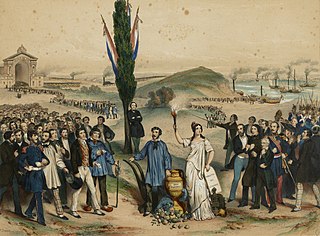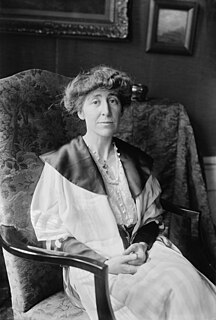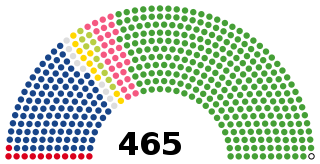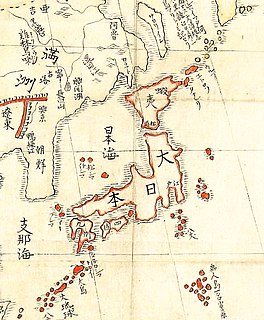
The Constitution of Japan is the constitution of Japan and the supreme law in the state. It is a heavily amended version of the Meiji Constitution and came into effect on 3 May 1947.

Suffrage, political franchise, or simply franchise is the right to vote in public, political elections. In some languages, and occasionally in English, the right to vote is called active suffrage, as distinct from passive suffrage, which is the right to stand for election. The combination of active and passive suffrage is sometimes called full suffrage.

Jeannette Pickering Rankin was an American politician and women's rights advocate, and the first woman to hold federal office in the United States. She was elected to the U.S. House of Representatives as a Republican from Montana in 1916, and again in 1940.

The House of Representatives is the lower house of the National Diet of Japan. The House of Councillors is the upper house.

Japan has an extended and vast history of discriminatory policies, actions, and stereotypical implentations among Japanese people and society. The national census shows the Japanese's pride in their culture and ethnicity; it states that, in summary, the majority of Japan's citizens identify as Japanese, approximately 97.8% as of 2018, according to the Japanese Statistics Bureau. Japanese people make up 98.1%, Chinese 0.5%, Korean 0.4%, and other 1% of people living in Japan, according to the CIA World Handbook. The discriminatory and racist views and treatment of the minorities within Japan are exemplified throughout educational access, job access, and overall societal treatment by those who ethnically identify as Japanese. According to census statistics in 2018, 97.8% of the population of Japan are Japanese, with the remainder being foreign nationals residing in Japan. The number of foreign workers has increased dramatically in recent years, due to the aging population and the lack of labor forces. A news article in 2018 suggests that approximately 1 out of 10 young population residing in Tokyo are foreign nationals.

Alice Stokes Paul was an American Quaker, suffragist, feminist, and women's rights activist, and one of the main leaders and strategists of the campaign for the Nineteenth Amendment to the U.S. Constitution, which prohibits sex discrimination in the right to vote. Paul initiated, and along with Lucy Burns and others, strategized events such as the Woman Suffrage Procession and the Silent Sentinels, which were part of the successful campaign that resulted in the amendment's passage in 1920.

The Silent Sentinels, also known as the Sentinels of Liberty, were a group of women in favor of women's suffrage organized by Alice Paul and the National Woman's Party. They protested in front of the White House during Woodrow Wilson's presidency starting on January 10, 1917. They were the first group to picket the White House. They started their protest after a meeting with the president on January 9, 1917, during which he told the women to "concert public opinion on behalf of women's suffrage." The protesters served as a constant reminder to Wilson of his lack of support for suffrage. At first the picketers were tolerated, but they were later arrested on charges of obstructing traffic. The women protested at the White House gates and later in Lafayette Square until June 4, 1919 when the Nineteenth Amendment to the United States Constitution was passed both by the House of Representatives and the Senate.

Princess Tomohito of Mikasa is a member of the Japanese Imperial Family as the widow of Prince Tomohito of Mikasa. She is also known as Princess Nobuko.
Japan is a constitutional monarchy. According to Ministry of Justice (MOJ) figures, the Japanese Legal Affairs Bureau offices and civil liberties volunteers dealt with 359,971 human rights related complaints and 18,786 reports of suspected human rights violations during 2003. Many of these cases were ultimately resolved in the court. Human rights issues occur in present-day Japan, as modernization history of Japan only reached in the non-humanity areas with the rise of military expansion of Empire of Japan in the 20th century. due to the rights of the citizens the republic causes a cascade in the government.

Feminism in Japan began with women's rights movements that date back to antiquity. The movement started to gain momentum after Western thinking was brought into Japan during the Meiji Restoration in 1868. Japanese feminism differs from Western feminism in the sense that less emphasis is on individual autonomy.
In most countries, suffrage, the right to vote, is generally limited to citizens of the country. In some countries voting rights are extended to resident non-citizens. Such rights are often restricted or limited in some ways, with the details of the restrictions or limitations varying from one country to another. Voting rights to non-citizens are not the same as a right to run for an elected or other public office.

Oman is an absolute monarchy in which all legislative, executive, and judiciary power ultimately rests in the hands of the hereditary sultan, and in which the system of laws is based firmly on Islamic sharia. Although a report by the U.S. State Department, based on conditions in 2010, summed up the human rights situation in the country by asserting that the government “generally respected the human rights of its citizens,” the details in the report itself strongly indicate otherwise, and several international human-rights groups have described the state of human rights in Oman in highly critical terms. According to a report, on 20 December 2015, poet and television producer Nasser al-Badri was summoned by the Police Special Section and detained for 12 days without charge and without trial. The report added that the Omani Observatory for Human Rights said that al-Badri was detained because of tweets he posted criticising Sultan Qaboos and the state of the country’s economy. Article 41 of Oman’s statute (constitution) criminalizes any criticism of the sultan, stating that the sultan’s ‘person is inviolable and must be respected and his orders must be obeyed’.

Mariko Peters is a former Dutch politician and civil servant as well as lawyer. She was an MP from November 30, 2006, to September 19, 2012. She focused on matters of foreign policy, judiciary, public administration, mass media and culture.
Trade unions in Andorra have had a brief existence, with the first trade union, the Andorran Workers' Union (AWU), being formed in 1990.

Women's suffrage in Japan can trace its beginnings back to democratization brought about by the Meiji Restoration, with the suffrage movement rising to prominence during the Taisho period. The prohibition of women from political meetings had been abolished in 1922 after demands from women's organizations led by activists such as Hiratsuka Raichō and Ichikawa Fusae. The movement suffered heavy setbacks during and after the Great Depression, when support for democracy began to wane and military influence over civilians increased dramatically. The first election by universal suffrage without distinction of sex was held in 1946, but it was not until 1947, when the constitution for post-war Japan came into effect, that universal suffrage was established In Japan.
Nobuko Iwaki is a Japanese politician of the Liberal Democratic Party, was a member of the House of Representatives in the Diet until 2009. A native of Minamiamabe District, Ōita, she attended Beppu University as an undergraduate and received a master's degree from Takushoku University. She was elected to the House of Representatives for the first time in 2005 after running unsuccessfully for the House of Councillors in the Diet in 2003.
Black suffrage refers to black people's right to vote and has long been an issue in countries established under conditions of black minorities.
Nouzha Skalli is a Moroccan politician from the Party of Progress and Socialism who served as Minister of Solidarity, Women, Family, and Social Development from October 2007 until January 2012 in the government of Abbas El Fassi.
Foreign workers in Saudi Arabia, estimated to number about 9 million as of April 2013, began migrating to the country soon after oil was discovered in the late 1930s. Initially, the main influx was composed of Arab and Western technical, professional and administrative personnel, but subsequently substantial numbers came from Southeast Asia.
Solidarity Network with Migrants Japan, abbreviated as SMJ, is a non-partisan advocacy organization and umbrella of migrant interest and support organizations founded 1997 in Japan. Solidarity Network with Migrants Japan was founded in 1997 by 66 migrant support groups and 72 individuals, who started to meet on a regular basis at the “nationwide forum for solidarity with migrant workers” in 1996. Since June 2015 SMJ is legally incorporated as Non-Profit Organization (NPO) under the Japanese NPO-law. Among the SMJ’s members are organizations as well as individuals. The SMJ’s office is located in Bunkyō ward, Tokyo. The largest part of its revenue comes from membership fees and subscriptions.











